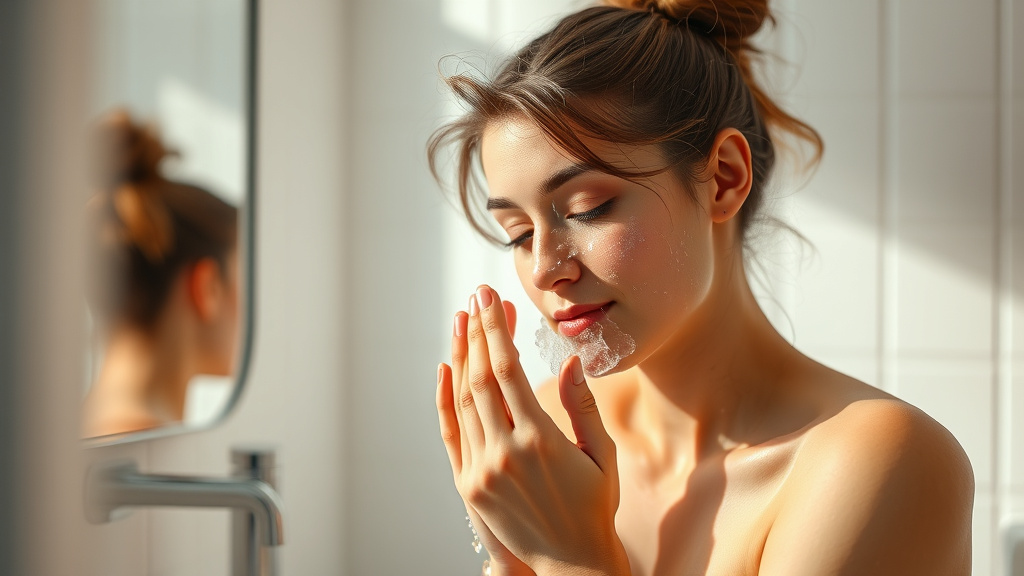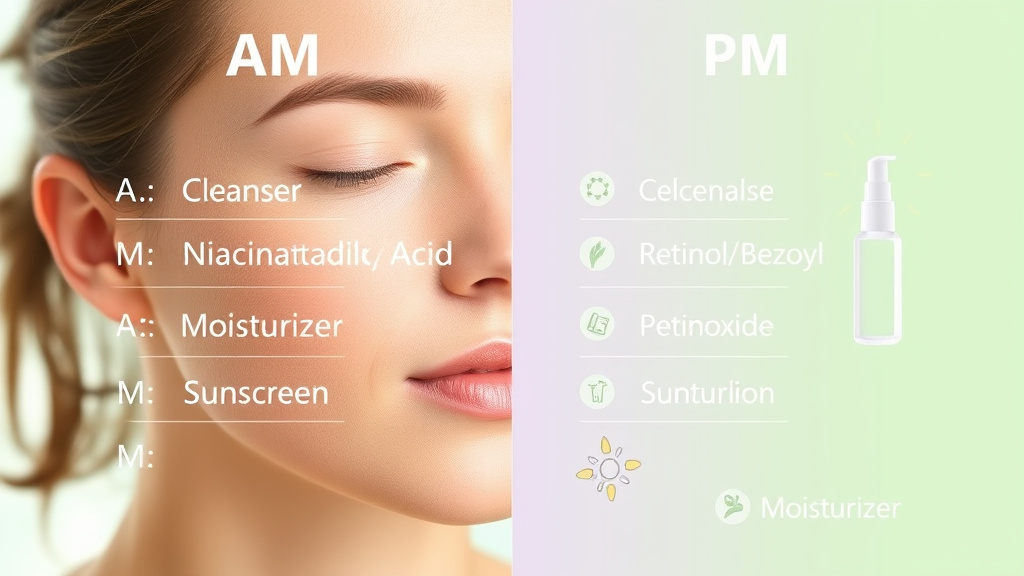Creating a skincare routine for acne prone skin can be a game changer in managing breakouts and maintaining a clear, healthy complexion. Acne-prone skin requires a thoughtful approach—balancing active ingredients that prevent pimples without irritating or over-drying your skin. In this comprehensive guide, we’ll explore how to develop an effective acne skincare routine that is practical, safe, and tailored to your skin’s unique needs. Whether you’re new to skincare or seeking to refine your habits, understanding the right products and routines can help support clearer skin over time. Remember, it’s not about quick fixes but consistent, gentle care with dermatologist-recommended ingredients like salicylic acid, niacinamide, and benzoyl peroxide.
Building a skincare routine for acne prone skin involves more than just using potent ingredients. It’s about understanding your skin type, identifying triggers, and pairing products thoughtfully. Achieving the best results hinges on your commitment to a consistent routine and avoiding common pitfalls like over-washing or skipping moisturizer. Throughout this guide, you’ll learn how to incorporate effective ingredients, choose products designed for acne-prone skin, and maintain a healthy skin barrier—all with an emphasis on safety, affordability, and simplicity. Now, let’s dive into the core of how to care for your skin effectively and naturally while minimizing breakouts.
Understanding Acne-Prone Skin

Acne-prone skin is characterized by an increased tendency to develop pimples, blackheads, and cysts. It often involves excess oil production combined with clogged pores and bacteria, which can lead to inflammation. Understanding what causes breakouts helps you identify effective strategies and avoid triggers that worsen your skin condition.
Causes of breakouts include:
- Excess oil (sebum): Overactive oil glands can clog pores, trapping bacteria and dead skin cells.
- Bacteria: Propionibacterium acnes, a bacteria found on the skin, can thrive in clogged pores and trigger inflammation.
- Hormonal fluctuations: Changes in hormones, especially during puberty, menstruation, or stress, can increase oil production.
- Diet and stress: Certain foods and stress levels can influence oil levels and inflammation.
- Environmental factors: Pollution and humidity may exacerbate breakouts.
Common triggers for acne include heavy or comedogenic skincare products, touching your face frequently, and harsh scrubs that damage the skin barrier. Identifying these factors helps tailor your acne skincare routine to be both effective and gentle.
According to WebMD’s acne care guide, breakouts are often caused by clogged pores, excess oil, and bacteria buildup. That’s why a tailored skincare routine for acne prone skin is essential to restore balance.
Skincare Routine for Acne Prone Skin
Morning Skincare Routine for Acne-Prone Skin

A well-structured morning routine can set the stage for a clearer day. The focus should be on gentle cleansing, targeted treatment, and protection from UV rays, which can worsen hyperpigmentation and inflammation.
- Step 1: Gentle Cleanser Start with a gel or foam cleanser designed for oily or sensitive skin. Look for formulations that are non-comedogenic, sulfate-free, and pH-balanced. This way, you remove excess oil and dirt without stripping your skin’s natural moisture barrier.
- Step 2: Treatment Serum (Niacinamide, Salicylic Acid) Follow up with a serum that contains niacinamide (2-5%), which can help regulate oil production, reduce redness, and improve skin texture. Additionally, a product with salicylic acid (0.5–2%) can penetrate pores to exfoliate inside and help prevent blockages that cause pimples. These ingredients are safe and effective options for sensitive skin as well.
- Step 3: Oil-Free Moisturizer Choose a lightweight, oil-free, gel-based moisturizer that hydrates without clogging pores. Focus on formulations that reinforce your skin barrier while controlling shine.
- Step 4: Sunscreen Finish with a broad-spectrum SPF 50 designed for acne-prone skin. Many formulations are non-comedogenic and formulated without potentially irritating ingredients like alcohol or fragrances. Proper sun protection is essential, not only for preventing dark spots but also for maintaining skin health.
Evening Skincare Routine for Acne-Prone Skin
Nighttime allows for more targeted active ingredients to work deeply, often with stronger formulations to combat stubborn acne.
- Step 1: Double Cleanse Begin with an oil-based cleanser to remove makeup, excess oil, and dirt, followed by your gentle morning cleanser. This ensures thorough cleansing without over-drying skin.
- Step 2: Treatment (Benzoyl Peroxide, Retinol, Azelaic Acid) Incorporate benzoyl peroxide (2.5–5%) sparingly in targeted areas to kill bacteria and reduce inflammation. For those tolerating it well, retinoids such as adapalene (available over the counter) may boost cell turnover and prevent clogged pores. Azelaic acid (both 10% and lower concentrations) can brighten hyperpigmentation and gently treat acne without irritation.
- Step 3: Lightweight Hydrating Serum Use a serum infused with hydrating ingredients like glycerin or hyaluronic acid to reinforce moisture. Even oily skin needs hydration to keep the skin barrier healthy.
- Step 4: Moisturizer Finish with a non-comedogenic, barrier-supporting moisturizer. Consider formulations rich in ceramides to support skin repair overnight, especially if using active treatments like retinoids.
Best Ingredients for Acne-Prone Skin
Effective acne skincare relies on proven ingredients:
- Niacinamide: Regulates oil, reduces redness, and improves skin texture.
- Salicylic Acid: A beta-hydroxy acid (BHA) that exfoliates inside pores.
- Retinol: Accelerates cell turnover, preventing pore clogging.
- Azelaic Acid: Combats bacteria and brightens dark spots.
- Clay Masks: Help absorb excess oil and impurities, especially during weekly treatments.
Ingredients to Avoid in a Skincare Routine for Acne-Prone Skin
Certain ingredients can trigger breakouts or irritate sensitive skin:
- Heavy oils and butters: Clogs pores and exacerbates acne.
- Alcohol-heavy toners: Can dry out skin excessively, prompting more oil production.
- Harsh scrubs and physical exfoliants: Damage the skin barrier, leading to inflammation and more breakouts.
Common Mistakes in Acne Skincare Routine
Despite your good intentions, some common errors undermine your efforts. Over-washing strips your skin of natural oils, prompting increased oil production and irritation. Using too many actives simultaneously can lead to dryness, redness, and even worsening acne, especially if your skin isn’t accustomed to strong ingredients. Skipping moisturizer can leave your skin vulnerable and dry, which ironically might trigger more oil production. Building a balanced, thoughtful acne skincare routine involves patience and moderation.
FAQs about Skincare Routine for Acne-Prone Skin
- Can I use makeup with acne-prone skin? Yes, but opt for non-comedogenic and oil-free formulas. Gentle, mineral-based settings powders or tinted moisturizers can provide coverage without clogging pores.
- How long until results show? Improvements may take 4–8 weeks, especially with active ingredients like retinoids and salicylic acid. Consistency is vital for long-term success.
- Do I need sunscreen if I stay indoors? Yes, as UV rays can penetrate windows. Consistent daily SPF offers protection against pigmentation and further skin damage.
Conclusion
Successfully managing acne-prone skin in 2025 involves developing a skincare routine for acne prone skin that emphasizes gentle cleansing, targeted actives, and barrier support. By understanding your skin’s triggers and choosing safe, effective ingredients like niacinamide, salicylic acid, and azelaic acid, you can help reduce breakouts while nourishing your skin. Remember, consistency and patience are your best allies; avoid common mistakes and always prioritize barrier repair. With the right routine tailored to your skin’s needs, achieving clearer, healthier skin is within reach—just take it step by step and stay committed to your skincare journey. Not medical advice.
Note: For more detailed routines tailored to specific skin types, explore our Skincare Routines Hub and other expert guides on our site.



